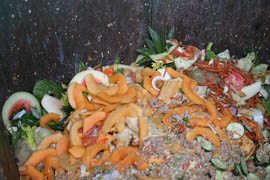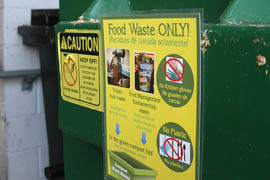Cronkite News has moved to a new home at cronkitenews.azpbs.org. Use this site to search archives from 2011 to May 2015. You can search the new site for current stories.
Universities join effort to reduce food waste, turn scraps into compost
TEMPE – This bin of apple cores, half-eaten sandwiches and other unappetizing scraps thrown out at Arizona State University’s Barrett Dining Hall would usually end up in a landfill. Instead, it will become compost to grow gardens and trees.
Committing to the Food Recovery Challenge organized by the U.S. Environmental Protection Agency, Arizona’s three public universities have pledged to reduce food waste on their campuses by a minimum of 5 percent over the next year. They are among dozens of universities taking part, along with grocery stores and entertainment venues.
Laura Moreno, an environmental scientist for the EPA’s Office of Pollution and Solid Waste, said the average college student produces about a half pound of food waste per day, making universities one of the largest sources of food waste.
“If we were to reduce just 5 percent of food wasted by students at the three Arizona universities that are participating in the Food Recovery Challenge, it would save almost 784,000 pounds of food from reaching landfills each year,” Moreno said.
The three-year challenge requires universities to track and weigh the amount of food they use, how much is thrown out and how much of that is composted.
While universities have already been working to eliminate waste in dining halls, Joseph Abraham, director of sustainability at the University of Arizona, said joining the EPA’s program adds guidance and incentive.
“We were doing much of this already, but it was a good opportunity to tighten up what we’re doing and track it better by weighing things but also was a way to challenge us to do more,” Abraham said.
The UA’s program, Compost Cats, collects unused food and compostable material from campus and a number of businesses and takes it to a composting site at the College of Agriculture and then donates it to community gardens.
Arizona State University, which has a goal of eliminating all solid waste by 2015, has started its Food Recovery Challenge efforts in two dining halls on the Tempe campus.
Nick Brown, ASU’s director of university sustainability practices, said that in many ways universities are leading their communities developing sustainable practices.
“If it works here, how much easier would it be in a lunchroom at Intel, where things are even more orderly, or an airport,” Brown said. “If we learn to do it effectively and efficiently here, it should be pretty easy for others.”
Since November, workers at ASU’s Hassayampa and Barrett dining halls have been separating food and paper scraps for composting and recycling.
In 2013, ASU will expand the program to additional dining facilities and begin using green bins in which students will dispose of food scraps and compostable food-service items and blue bins for recyclable material.
Brown said including sustainable practices in universities will help to familiarize young people with them.
“We have 83,000 campus users, 71,000 students who are going to go out in the world after their time here, and these are life skills and habits we want them to take in the world as part of their college education,” he said.









